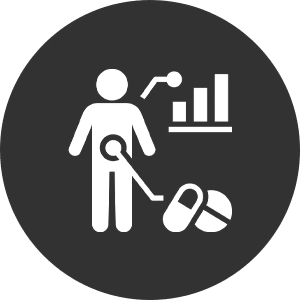Autologous Haematopoietic Stem Cell Transplantation for highly active treatment resistant multiple sclerosis

type of intervention
Interventional

recruitment status
Recruiting

region
VIC
type of ms
Relapsing remitting MS
We propose to study the benefits and risks of Autologous Haematopoetic Stem Cell Transplant (AHSCT) in people who have an aggressive form of MS not controlled by conventional treatment. Participants will have AHSCT at The Alfred hospital, and they will be closely monitored for 5 years post the transplant to ensure their safety, and also level of Multiple Sclerosis disease activity.
1. Male and female participants aged 18-60 with MS (2017 revised McDonald criteria)
2. Expanded Disability Status Scale (EDSS) score between 0 and 6
3. Highly active RRMS despite continuing to use conventional treatment for RRMS within the past 2 years
Definition of ‘highly active’ RRMS
i.
1. Greater than or equal to 1 severe relapses (Change in EDSS greater than or equal to 1 or 0.5 for those with pre relapse EDSS greater than or equal to 5.5) (or documented changes in neurological examination consistent with these magnitudes) and/or incomplete recovery from clinically significant relapses within the last 12 months
and
2. Greater than or equal to 1 gadolinium-positive (Gd+) lesion of diameter greater than or equal to 3 mm on MRI within the past 6 months.
or
3. Accumulation of any new T2 lesions on follow up MRI scans
ii.
1. Change in EDSS greater than or equal to 1 or 0.5 for those with pre relapse EDSS greater than or equal to 5.5)
and
2. evidence of new MRI activity either T1 or T2 performed on follow up MRI scans
4. Neurologically stable participants with no evidence of relapse for at least 30 days prior to study entry into the treatment period.
5. Females of childbearing potential must
a. have a negative pregnancy test at baseline prior to entry into the treatment period
b. use simultaneously two forms of effective contraception (either i.e partner) during and for 3 months after HSCT
c. females that are either post-menopausal for 12 months prior to entry into the treatment period or surgically sterile (through hysterectomy or bilateral oophorectomy) are not required to use birth control.
6. Able to provide informed consent and the absence of mental and cognitive deficits which can interfere with the capability of providing the informed consent for participation in the study prior to the Screening.
- 1. Participants with a non-relapsing form of MS (primary or secondary progressive MS)
- 2. Participants with any medically unstable condition, as assessed by the primary treating physician.
- 3. Participants with any of the following cardiovascular conditions:
- a) history of cardiac arrest;
- b) myocardial infarction within the past 6 months prior to enrolment or with current unstable ischemic heart disease
- c) cardiac failure at time of Screening (Class III, according to New York Heart Association Classification) or any severe cardiac disease as determined by the investigator.
- d) Left Ventricular (LV) ejection fraction < 45%
- e) hypertension, not controlled by prescribed medications
- 4. Participants with any of the following pulmonary conditions:
- a) severe respiratory disease or pulmonary fibrosi
- b) tuberculosis, except for history of successfully treated tuberculosis or history of prophylactic treatment after positive PPD skin reaction
- c) abnormal chest x-ray suggestive of active pulmonary disease
- d) abnormal Pulmonary Function Tests: FEV1, FVC values lower than 70% of predicted, DLCO values lower than 60% of predicted
- 5. Participants with any of the following hepatic conditions:
- a) known history of alcohol abuse, chronic liver or biliary disease
- b) total bilirubin greater than the upper limit of the normal range, unless in context of Gilbert’s syndrome
- c) conjugated bilirubin greater than the upper limit of the normal range
- d) AST, ALT greater than 2 times the upper limit of the normal range
- e) alkaline phosphatase (AP) greater than 1.5 times the upper limit of the normal range
- f) gamma-glytamyl-transferase (GGT) greater than 3 times the upper limit of the normal range
- 6. Participants with abnormal laboratory values:
- a) serum creatinine >150 µmol/L
- b) white blood cell (WBC) count <3.5x109/L or lymphocyte count <0.8x109/L
- 7. Participants with any of the following neurological or psychiatric conditions:
- a) history of substance abuse (drug or alcohol) or any other factor (i.e., serious psychiatric condition) that may interfere with the subject’s ability to cooperate and comply with the study procedures
- b) progressive neurological disorder, other than MS, which may affect participation in the study or require the use of medications not allowed by the protocol
- 8. Participants unable to undergo MRI scans, including history of severe hypersensitivity to gadolinium
- 9. Participation in any clinical research study evaluating another investigational drug or therapy within 6 months prior to baseline
- 10. Pregnant or nursing (lactating) women, where pregnancy is defined as the state of a female after conception and
- 11. Participants unwilling to use effective contraception
Already started
Dr Cassie Nesbitt
The Alfred Hospital
55 Commercial Road
Melbourne 3004 VIC
P: 03 9903 8662
E: msniadmin@alfred.org.au
VIC
Full details of the trial can be found on the ANZCTR clinical trials database
Yes
21/10/2025
Subscribe to MS Australia's newsletter
"*" indicates required fields

